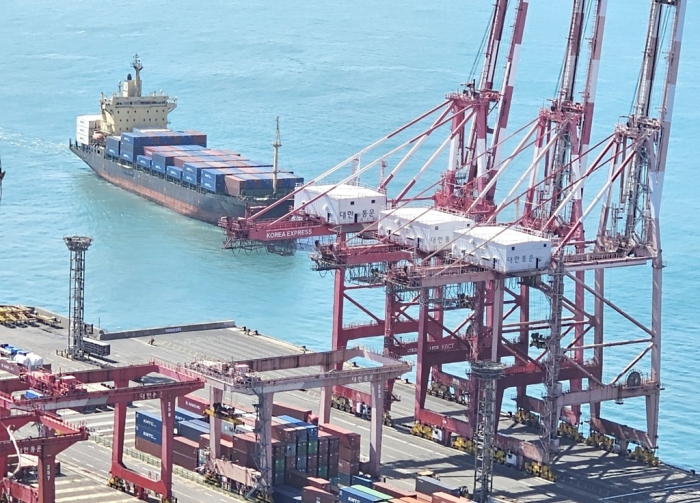Economy
Korea inflation at 21-month low; BOK may end rate hikes
Most government bond yields dip as core inflation also drops to a 13-month trough; exports are likely to bottom out
By Jul 04, 2023 (Gmt+09:00)
2
Min read
Most Read
LG Chem to sell water filter business to Glenwood PE for $692 million


KT&G eyes overseas M&A after rejecting activist fund's offer


Kyobo Life poised to buy Japan’s SBI Group-owned savings bank


StockX in merger talks with Naver’s online reseller Kream


Meritz backs half of ex-manager’s $210 mn hedge fund



South Korea’s headline inflation dropped for a fifth straight month to a 21-month low, adding to expectations that the central bank might not raise interest rates further to accelerate a recovery in Asia’s fourth-largest economy.
Consumer prices rose 2.7% in June from a year earlier, their slowest pace since September 2021, government data showed on Tuesday. That compared with a 3.3% increase in May, 3.7% in April, 4.2% in March, 4.8% in February and 5.2% in January year-on-year.
Petroleum costs tumbled 25.4% last month versus the same period a year earlier — the largest drop since January 1985, when the country began compiling such data. Gasoline and diesel prices were down 23.8% and 32.5% on-year, respectively.
Annual core inflation, which excludes volatile food and energy prices, dipped to 3.5%, its lowest since May 2022, indicating a continued easing of price pressure in the local economy.
After the data release, most government bond yields dipped in the morning. The highly liquid three-year debt yield fell 0.9 basis point to 3.604% and the five-year bond yield also slipped 0.8 bp to 3.582%, according to the Korea Financial Investment Association.
The Bank of Korea is scheduled to hold a policy meeting on July 13. The central bank kept its base interest rate steady at 3.50% in May but BOK Governor Rhee Chang-yong left the door open for an additional hike.
TRADE SURPLUS
South Korea reported a trade surplus in June, its first in 16 months, as exports fell at the slowest pace in eight months, separate government data showed earlier this month.
The country logged a surplus of $1.1 billion last month as exports dipped 6% year-on-year, the lowest drop since October last year, according to the data. Imports slid 11.7% on lower energy prices.

Exports of automobiles and ships surged 58.3% and 98.6% from a year earlier, respectively, although overseas sales of semiconductors, the country’s top export item, dropped 28% on-year. South Korea is home to the world’s two largest memory chipmakers – Samsung Electronics Co. and SK Hynix Inc.
Overall exports are expected to bottom out and help the trade-dependent economy maintain recovery momentum, although the revival is not likely to cause the central bank to ramp up interest rates further, analysts said.
“With the recovery continuing, the Bank of Korea is likely to remain hawkish for the time being,” Min Joo Kang, senior economist for South Korea and Japan at ING, said in a note.
“However, we still do not foresee additional hikes until the end of this year, as inflation is expected to reach the 2% range soon and to stay there throughout the year.”
Write to Se-Min Huh at semin@hankyung.com
Jongwoo Cheon edited this article.
More to Read
-
 Food & BeverageSouth Korea’s next price cut target to ease inflation; flour prices
Food & BeverageSouth Korea’s next price cut target to ease inflation; flour pricesJun 26, 2023 (Gmt+09:00)
3 Min read -
 Central bankBOK leaves door open for another quarter-point rate rise
Central bankBOK leaves door open for another quarter-point rate riseMay 25, 2023 (Gmt+09:00)
2 Min read -
 EconomyKorea inflation at 19-mth low; casts doubts over rate hike
EconomyKorea inflation at 19-mth low; casts doubts over rate hikeJun 02, 2023 (Gmt+09:00)
2 Min read -
 EconomyS.Korean inflation rises at slowest rate in 10 months in February
EconomyS.Korean inflation rises at slowest rate in 10 months in FebruaryMar 06, 2023 (Gmt+09:00)
2 Min read -
 EconomyKorea’s inflation picks up 5.2% in January on high utility prices
EconomyKorea’s inflation picks up 5.2% in January on high utility pricesFeb 02, 2023 (Gmt+09:00)
3 Min read
Comment 0
LOG IN


